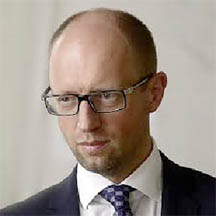HORLIVKA, Ukraine, (Reuters) – Pro-Moscow separatists seized government offices in more Ukrainian towns yesterday, in a further sign that authorities in Kiev are losing control of the country’s eastern industrial heartland bordering Russia.

Gunmen who turned up at dawn took control of official buildings in Horlivka, a town of almost 300,000 people, said a Reuters photographer. They refused to be photographed.
The heavily armed men wore the same military uniforms without insignia as other unidentified “green men” who have joined pro-Russian protesters with clubs and chains in seizing control of towns across Ukraine’s Donbass coal and steel belt.
Some 30 pro-Russian separatists also seized a city council building in Alchevsk, further east in Luhansk region, Interfax-Ukraine news agency said. They took down the Ukrainian flag and flew a city banner before allowing workers to leave.
Attempts to contain the insurgency by the government in Kiev have proved largely unsuccessful, with security forces repeatedly outmanoeuvred by the separatists. The West and the new Ukrainian government accuse Russia of being behind the unrest, a charge Moscow denies.
Daniel Baer, the U.S. ambassador to the OSCE, a European security watchdog which has monitors in the region, told reporters in Vienna: “I think it’s very clear that what is happening would not be happening without Russian involvement.”
A police official in Donetsk, the provincial capital where separatists have declared a “People’s Republic of Donetsk”, said separatists were also in control of the Horlivka police station, having seized the regional police headquarters earlier in April.
The murder of a town councillor from Horlivka who opposed the separatists was cited by Kiev last week among reasons for launching new efforts to regain control of the region.
Yesterday’s takeovers followed the fall of the main government buildings on Tuesday further east in Luhansk, capital of Ukraine’s easternmost province, driving home just how far control over the densely populated region has slipped from the central government in Kiev.
“They’ve taken them. The government administration and police,” the police official said of Horlivka.
The town sits just north of Donetsk, unofficial capital of the whole Donbass area, where mainly Russian-speaking separatists have called a referendum on secession for May 11.
Many hope to follow Crimea’s
break from Ukraine in March and subsequent annexation by Russia, following the overthrow of Ukraine’s Moscow-backed president Viktor Yanukovich in late February in a tug-of-war between the West and Russia over the strategic direction of the former Soviet republic.
The Donbass region is home to giant steel smelters and heavy plants that produce up to a third of Ukraine’s industrial output. An armed uprising began there in early April, with Kiev almost powerless to respond for fear of provoking an invasion by tens of thousands of Russian troops massed on the border.
Many Russian-speaking business “oligarchs” from the Donbass backed Yanukovich and exercise great influence over the region.
Yesterday, the most powerful of these, Ukraine’s richest man Rinat Akhmetov issued a formal statement saying he remained committed to his investments in the Donbass and to keeping the region as part of Ukraine.
Prime Minister Arseny Yatseniuk warned his ministers their jobs were on the line if the east remained out of reach – “The country demands action,” he said.
Oleksander Turchinov, Ukraine’s acting president until after an election on May 25, reiterated yesterday that police were incapable of reasserting control in the region and said the armed forces were on full alert for a Russian invasion.
That prompted a return volley from Moscow, where the Foreign Ministry demanded that Kiev “immediately ceases the bellicose rhetoric, which is aimed at intimidating its own population”.




